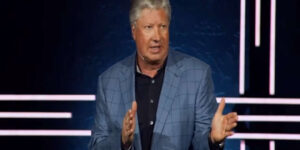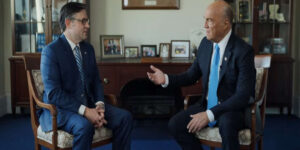New York Rally Protests Ahmadinejad, Dinner Hosts
More than 60 religious, human rights and public interest groups put aside their patent differences Thursday night to stage a major demonstration in midtown Manhattan protesting a dinner banquet attended by Iranian President Mahmoud Ahmadinejad that was hosted by various organizations, including Quaker and Mennonite groups.
Some in the Christian community condemend the actions of those who hosted Ahmadinejad, especially dinner hosts who called themselves Christians.
Malcolm Hedding, executive director of the Israel-based International Christian Embassy Jersualem (ICEJ), said Christians playing host and “shamelessly” honoring Ahmadinejad will “forever be associated with the appeasement of wickedness.”
“While [we] welcome efforts to de-radicalize religious perceptions and create an atmosphere of tolerance and respect for our differences,” he said, “it is outrageous that the main guest at this dinner is someone who so thoroughly mocks and loathes these valued ideals.”
Beth Gilinsky, leader of Women United and organizer of the protest rally, invited to the demonstration “all human rights activists and religious organizations and leaders of all backgrounds, faiths, and political affiliation who find the threats to innocent peoples an affront to morality and Western civilization.”
Hundreds of protesters rallied in front of Grand Central Station, further slowing New York’s rush-hour traffic, to clearly articulate their opposition to Iran’s stated plans for destroying Israel, proliferating nuclear weapons, and brutally violating Iranians’ human rights.
Michael Hines, a U.S. spokesperson for ICEJ who attended Thursday’s rally, told Charisma Friday that he was impressed by how well Christians were represented.
The eclectic groups of protesters included: Arabs for Israel, American Islamic Forum for Democracy, Jewish Action Alliance, Log Cabin Republicans of New York City, Open Doors USA, Southern Baptist Convention’s Ethics and Religious Liberty Commission and Women’s Freedom Movement of Pakistan.
Hines said although some members among the 60 groups protesting held a natural affinity for one another, many did not. “It’s always tricky when you have so many different organizations with a lot of different agendas,” Hines said. “But we were all to put aside our differences. The main focus [of the rally] was very clearly that this man is a threat to the world.”
The dinner with Ahmadinejad was given the theme: “Has Not One God Created Us? The Significance of Religious Contributions to Peace.” It was sponsored by the Quaker-based American Friends Service Committee, the Mennonite Central Committee, the Quaker United Nations Office, Religions for Peace and the World Council of Churches.Â
In the invitation, the inter-faith banquet’s hosts billed it as a “conversation” about the role of religion in the world and how to better achieve world peace. Muslim paticipants were encouraged to use the evening to break their Ramadan fast. “It is our hope,” they stated, “[that] this communal meal and exchange of views will enable us to explore faith perspectives for dealing with global issues … while deepening mutual understanding.”
Aside from Christian, Jewish and Zoroastrian religious leaders, a black American Muslim cleric known for long supporting the Iranian regime also attended, according to The Jerusalem Post. The Anti-Defamation League describes the ideologies of Imam Abdul Alim Musa as “radical and anti-Semitic.”
Religious groups meeting with Ahmadinejad “are being used to give legitimacy to one of the world’s greatest violators of human and religious rights,” stated organizers of Thursday’s protest in Manhattan, in a statement on their Web site, 925rally.org.
“[We’re making] an important statement to Ahmadinejad,” it continued, “the Mullahs back home in Iran, to our ally Israel, and to the American media and public, that we protest anyone meeting with him, much less defacto honoring him, and giving legitimacy to his nuclear ambitions and his dire threats against the U.S., Israel and the rest of the world.”
Hines said a young Iranian student leader named Amir Abbas Fakhravar, who was tortured in Iran but later escaped to the West, addressed the crowd Thursday in Persian. “[Fakhravar] really condemned the West’s kowtowing to an Iranian regime that tortures and abuses so many people,” Hines said. “He made it very clear that the best thing the [U.S.] administration can do is refuse to talk to the Iranian regime.”
Besides Ahmadinejad, other speakers at the dinner included Miguel D’Escoto Brockmann, president of the General Assembly of the United Nations, and Kjell Bondevik, president of the Oslo Center for Peace and Human Rights.
Despite Ahmadinejad’s success in attracting heavy media attention during his week in New York, Hines believes what some have called Israel’s best friends—Christians—ably demonstrated their strong support and solidarity for the tiny Jewish nation. “We really feel [Christians] made a stand,” he said. “It’s not necessarily your job to project your own voice farther than you can project it. You just have to speak up and make a stand.”





































